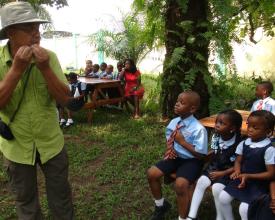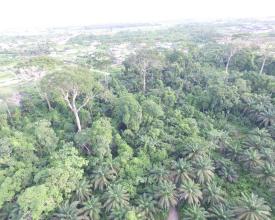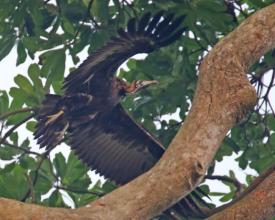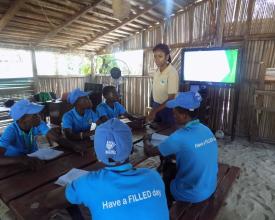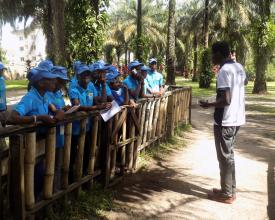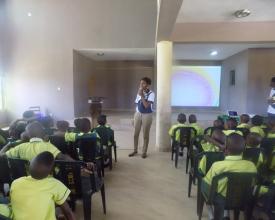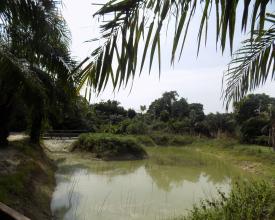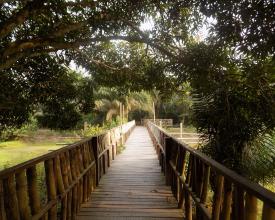Preserving LUFASI, a privately Protected Area within the densely populated Lekki, Lagos, Nigeria.
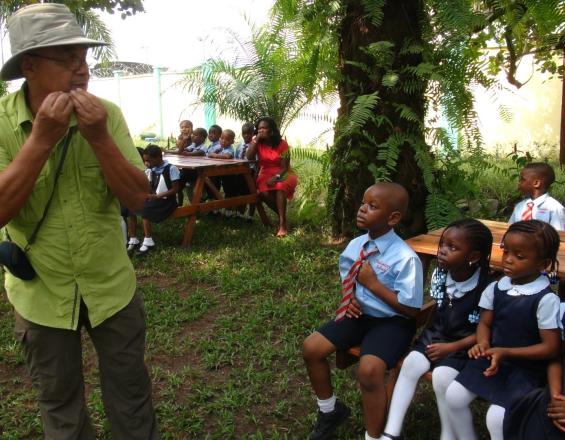
The Lekki Urban Forest and Animal Sanctuary Initiative (LUFASI), a green space in the Lekki Peninsula of Lagos, Nigeria, provides ecological benefits which contribute to the social economic development of the people and mitigating climate change issues in Lagos and Nigeria - at large. However, due to habitat mismanagement practices like heavy encroachment and littering, the LUFASI flora and fauna gets disturbed. In addition, there is a lack of awareness on the importance of the protection of our forests and its benefits. With the establishment of proper habitat management techniques such as constructing an erect boundary fence to dissuade unauthorised entry and implementation of rigorous sensitisation campaigns in the nearby communities, schools, organisations, and the public via designation of nature trails, our interactive workshops provision of informative brochures on the importance of our forests.
Context
Challenges addressed
Environmental:
-
Forest Encroachment: Lagos’s increasing urbanisation puts pressure on the remaining green spaces in the city. Since LUFASI’s inception, there have been cases of unauthorised tree loggers entering, cutting down trees and collecting firewood. Poachers have killed most of the Blue Duikers (Philantomba monticola) in their natural habitat for bushmeat. The critically endangered Hooded Vulture (Necrosyrtes monachus) were hunted in the forest for traditional purposes. Outsiders have been caught using the forest as a linking corridor and farm sites.
Socio-Economic
-
Lack of environmental awareness on forest protection: LUFASI’s educational outreach of 2,000 people monthly is still insufficient in creating a positive behavioural change to forest protection. There are several government officials whose nonchalant stances have trickled down to the education system where 70% of pupils visiting are clueless of the importance of green spaces (like LUFASI) in a highly populated Lagos.
Location
Process
Summary of the process
As the deforestation state of the Lekki Peninsula has become quite appalling especially its increasingly negative effects on the very life support ecosystems in the state, LUFASI came into fruition to address the issue of limited green spaces within urban areas to serve recreational and educational purposes through activities that aim to conserve its forest, educate the public, and collaborate with stakeholders. LUFASI’s 20ha forest had a boundary fence constructed to minimize intruders and the habitat was maintained and managed in order to create an aesthetic forum to enlighten the public on the importance of forest conservation and other environmental issues. These have made LUFASI gain the attention of schools and public at a local level and needs to be scaled up to national and maybe global levels in the country that is least concerned about the fate of our forests. With the sensitization campaigns of the importance of the protection of the health of our forests via our educative tours, booklets and workshops, there will be habitat management efforts like erection of the boundary fence, improving nature trails and the addition of forest themed informative placards occurring simultaneously.
Building Blocks
Awareness creation on the importance of Green Spaces.
For many, the concept of protected area has not yet been fully understood in Nigeria and Lagos in particular. In this wise, LUFASI has taken a full responsibility in educating the public, especially the locals on the importance of protected areas and their ecological benefits for the overall environmental sustainability of humanity. To this end, LUFASI develops creative tools for teaching about Climate Change (CC), Forest Conservation (FC), Plastic Pollution and engage in Community Outreach using the PA as a living laboratory where students and group visitors can learn. The CC workshop is an interactive learning, which informs students and group visitors of the critical challenges facing our Earth’s climate (caused by unsustainable practices such as the destruction of forests) and empowers them to take local action for global change. Forest conservation programme focuses on bridging the knowledge gap in our forest biodiversity and importance for ecosystem balance, and expanding green cover and natural habitats across Lagos state. Plastic Pollution practical workshops focus on reducing plastic use that has put the world under threat including commemorating global environment days to further enlighten and advocate for a healthy natural environment with focus on protected areas.
Enabling factors
-
Increased participatory engagement with local communities and the public.
-
Increased collaboration with government and its relevant agencies such as the Ministry of Environment, Lagos State leading to an increased awareness on the benefits of Pas for the overall of the environment.
-
Support from grants such as the GreenFund Grant, which awarded LUFASI with $3000 that was channelled towards the creation of relevant education materials including LUFASI’s Climate Change Animated Video and colourful booklets.
Lesson learned
Protection and conservation of green spaces are ineffective without the effective engagement of environmental awareness measures. When people are enlightened, they are able to make informed decisions. In this light, those who went through our workshops have been stirred up to think critically on how the state of our rapidly deteriorating environment can be salvaged. As a result, many have been challenged to develop and engage in innovative solutions that can solve environmental problems at the school and community levels. Furthermore, our various workshops have inspired a small lifestyle change that influence them to pursue responsible environmental stewardship and leadership in their various endeavours towards environment. However, lack of increased funding to develop more educating materials to reach out to more people within the local communities and the public has been a major challenge.
Natural Habitat Protection and Management to reduce encroachment.
LUFASI having an isolated 20ha forest lodged in the middle of a highly commercialised and densely populated Lekki peninsula of Lagos burdens its health. The forest has a partially completed boundary fence, which has reduced the authorized entry by 40% . This along with the scheduled patrols stopped loggers and poachers from game hunting in the forest for business and traditional purposes. Although there are stringent rules regarding unauthorized entry, there is still encroachment by the nearby community members which heavily disturbs the forest and the biodiversity present. The public would either enter to get firewood, manage small farms within the forest or use it as a corridor to the other side of the park. The completion of the perimeter fence will minimize the intrusion to 96% and allow the density of the flora and fauna population to increase thereby creating an ecological balance in the forest. LUFASI invokes the importance of green spaces to their tourists and visitors through the construction of sustainable bamboo and Ekki walking bridges and pathways to give the park a more natural and aesthetic appeal. We want to further improve by clearing and developing more nature trails showcasing the beauty and importance of the forests to biodiversity and us humans.
Enabling factors
The availability of funds to carry out park management operations.
Park enforced and designated as a reputable Protected Area from esteemed organisations.
LUFASI being seen as an important stakeholder among the state and federal ministries of environment for collaboration in Nigeria.
Lesson learned
Community(especially those nearby the forest) and children (including school pupils)engagement in the forest’s protection.
Display of informative placards with park rules and regulations, the importance of biodiversity conservation etc.
Prior awareness in form of trainings, workshops and conferences to instill environmentalism in the education system and policy makers in order to smoothly enforce the protection of the urban forest or to be designated as a PA.
Impacts
Environmental: The installation of LUFASI’s boundary fence restricts access into the forest. It is left undisturbed with plants being left to grow and the wildlife seeking protection, thereby stabilising their populations for a balanced, functioning ecosystem. In addition, the green belt provides a more oxygenated environment by purifying the air from excess carbon dioxide while producing oxygen for the environment. The presence of trees also help to purify our ground water through their roots and also help to hold our soils to prevent erosion.
Socioeconomic: It has been scientifically proven that forests provide preventive healthcare services (via forest bathing) in decreasing the risk of heart attack and improving energy levels and better sleep. LUFASI’s privately protected forest offers employment opportunities to people including those of the neighbouring communities. Currently LUFASI has a staff strength of 30 workers including unskilled workers. Through our social media platforms, tours and workshops, LUFASI offers an educational platform for the public on the benefits of forests to empower the public with garnered knowledge of its importance to our sustenance. With a mix of school pupils, rural communities, government officials and the general public, LUFASI reaches out to a minimum of 12,000-15,000 tourists yearly.
Beneficiaries
The LUFASI forest and its biodiversity.
The schools: In 10 schools having 1000 pupils each.
The community: Across 10 communities having about 100 people each.
Direct Audience: 16,100 people
Indirect Audience (print and electronic media) 100,000 people
Sustainable Development Goals
Story
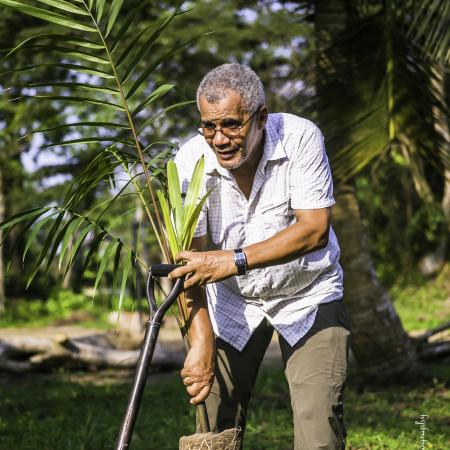
After having worked and lived in Kenya for 3 years, over 30 years ago, I had become quite inspired by the Kenyan’s sustainable management of their environment to provide multiple job opportunities with a good income stream through agriculture and ecotourism. I was thus led to delve into farming on my return to Nigeria, where I acquired land on the Lekki peninsula for this purpose. I observed first hand, during the process of establishing my agroforestry palm plantation, the extremely rapid and brutal transformation of a large portion of the Lekki axis. Over the past 25 years, the pristine mangrove swamp forest with small, scattered and mildly benign settlements was transformed into a cluttered and overcrowded urban sprawl with very little consideration for the crucial role of the coastal wetland in the ecosystem. This compelled me to follow the Nigerian Conservation Foundation example to preserve a small portion of this unique habitat, which contained some rare species of Flora and fauna. With the cooperation of the Lagos State Government, we were able to gazette a 20 acre portion of the farm as a reserve with 99-year lease tenure on the Certificate of Occupancy.
During this period one had become quite appalled by the increasingly negative effects humanities footprints were having on the very life support ecosystems of the planet which were manifesting themselves mainly through massive species loss and global warming induced climate change. A situation that would eventually become irreversible and with totally catastrophic consequences. The fact that this has been brought about through gross ignorance and a hard-hearted lack of caring for nature has resulted in one deciding to dedicate one’s life to try to reverse this trend. The dedication of the Lekki Urban Forest Animal Sanctuary Initiative (LUFASI) to providing multiple platforms and tools for creating awareness to the public of the looming danger lurking if the environment isn't cared for.
LUFASI became an urban forest to connect people to interact with nature, while being a refuge for many fauna species like the African Civet Civettictis civetta, Blue Duiker Philantoba monticola, Nile Monitor Varanus niloticus, over 60 avian species including the Critically Endangered Hooded Vulture Necrosyrtes monachus,insect species, amphibian and reptilian species like the Western Green Mamba Dendroaspis viridis.
Desmond Majekodunmi.

